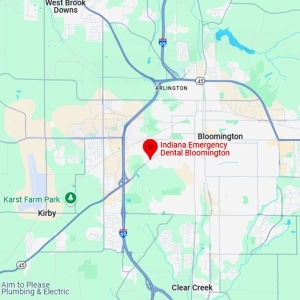Sedation Dentistry in Indianapolis & Bloomington, IN

Does the thought of seeing your dentist make you feel nauseous? Sedation dentistry is a useful tool for patients who have a greater-than-usual fear of having a dental procedure. When your dentist in Indianapolis, IN, administers sedation, it causes a calming effect. You may feel less anxious and scared and be better able to tolerate your appointment.
Contrary to how it sounds, the sedation used in dentistry does not always make you unconscious. In fact, it’s more likely your dentist will use a form of sedation that only relaxes you. This, combined with a local anesthetic, is usually all that’s needed for a successful trip to the dentist. There are different levels of sedation commonly used in dentistry.
Inhaled Minimal Sedation
Using this method, your dental professional will ask you to inhale nitrous oxide through a mask placed over your nose and mouth. This substance, often referred to as “laughing gas,” relaxes you during your procedure and wears off quickly afterward. Patients who are given nitrous oxide may act silly or be less inhibited while they’re under the influence of the gas, hence the nickname.
Oral Sedation
Oral sedation is given in pill form, usually about 60 minutes before you have your procedure. Depending upon the dose, you may feel sleepy throughout the procedure, or you may fall asleep completely. Dentists typically use halcion for dental sedation, which is a benzodiazepine often used to treat insomnia or anxiety.
IV Moderate Sedation
If your dentist opts for IV moderate sedation, you’ll be given sedatives through an IV that’s inserted in your vein. The medication eases anxiety, panic, or fear, so you’re able to relax during your visit. While you may still be aware of what’s happening around you, you’ll have no memory of pain or discomfort.
General Anesthesia
General anesthesia is the same type of anesthesia you might have when undergoing a minor surgery. If an anesthesiologist administers general anesthesia, you will be completely unconscious throughout your procedure. This option is the most infrequently used form of dental sedation because it poses a few additional risks.
Regardless of which type of anesthesia your dentist suggests, they’ll be sure to go over your complete medical history first, including any medications you’re taking or chronic conditions you have. In this way, they can help you make the safest, most well-informed decision for your upcoming visit.
Who Can Administer Dental Sedation?
Not every dentist is able to administer every form of sedation, although most can give minimal sedation in the form of pills or nitrous oxide. If you’re prepping for a more complex dental procedure that requires moderate sedation or general anesthesia, your dentist may refer you to an oral and maxillofacial surgeon or enlist the help of a dental anesthesiologist for treatment.
Who Can Have Dental Sedation?
Most adults are suitable candidates for dental sedation. However, your dentist won’t advise it for routine appointments, such as teeth cleaning, unless you suffer undue anxiety. There may be other reasons your dental professional recommends sedation, though. They include:
- Treating someone with a very low threshold for pain
- Treating a patient who can’t sit still (such as a child)
- Treating someone who has an overactive gag reflex
If your dentist is performing a long procedure or several procedures back-to-back, they may also recommend some form of sedation, just to keep you comfortable throughout.
Dental Sedation in Indianapolis, IN
For more information on sedation dentistry in Indianapolis, IN, give Indiana Emergency Dental a call today. At Indiana Emergency Dental, we’re ready to help when accidents occur, and our friendly and experienced team will do their best to set you at ease. Contact us today to learn more.







